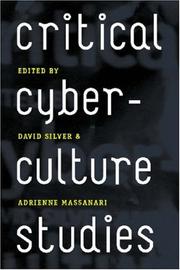| Listing 1 - 10 of 273 | << page >> |
Sort by
|
Book
ISBN: 9781626164970 9781626164987 9781626164994 Year: 2017 Publisher: Washington, D.C. Georgetown University Press
Abstract | Keywords | Export | Availability | Bookmark
 Loading...
Loading...Choose an application
- Reference Manager
- EndNote
- RefWorks (Direct export to RefWorks)
Analogies help us think, learn, and communicate. The fourteen case studies in this volume help readers make sense of contemporary cyber conflict through historical analogies to past military-technological problems. The chapters are divided into three groups. The first - What Are Cyber Weapons Like ? - examines the characteristics of cyber capabilities and how their use for intelligence gathering, signaling, and precision strike compares with earlier technologies for such missions. The second section - What Might Cyber Wars Be Like ? - explores how lessons from several wars since the early 19th century, including the World Wars, could apply or not apply to cyber conflict in the 21st century. The final section - What Is Preventing and/or Managing Cyber Conflict Like ? - offers lessons from 19th and 20th century cases of managing threatening actors and technologies.

ISBN: 9780814740248 9780814740231 0814740235 0814740243 Year: 2006 Publisher: New York (N.Y.): New York University press,
Abstract | Keywords | Export | Availability | Bookmark
 Loading...
Loading...Choose an application
- Reference Manager
- EndNote
- RefWorks (Direct export to RefWorks)
Computer architecture. Operating systems --- Sociology of culture --- Computers and civilization. --- Cyberspace --- Internet --- Social aspects. --- Computers and civilization --- Social aspects --- Internet - Social aspects --- Cyberspace - Social aspects
Book
ISBN: 9783631602850 3631602855 Year: 2011 Publisher: Frankfurt am Main: Peter Lang,
Abstract | Keywords | Export | Availability | Bookmark
 Loading...
Loading...Choose an application
- Reference Manager
- EndNote
- RefWorks (Direct export to RefWorks)
Information warfare --- Asymmetric warfare --- Guerre de l'information --- Guerre asymétrique --- Cyberspace --- Cyberspace operations (Military science) --- Security measures --- hybrid war --- hybrid warfare --- Guerre asymétrique --- Polemology
Book
ISBN: 9780190876807 9780190876791 9780190876814 9780190876821 0190876808 0190876794 Year: 2018 Publisher: New York, NY: Oxford university press,
Abstract | Keywords | Export | Availability | Bookmark
 Loading...
Loading...Choose an application
- Reference Manager
- EndNote
- RefWorks (Direct export to RefWorks)
"Our current understanding of fake news and cyber warfare aside, many people still believe that the internet represents a cosmopolitan ideal over which the flow of diverse information educates and empowers users. The Chinese case defies these expectations. Nationalism, in China as much as elsewhere, is today adopted, filtered, transformed, enhanced, and accelerated through digital networks. And as we have increasingly seen, nationalism in digital spheres interacts in complicated ways with nationalism "on the ground". If we are to understand the social and political complexities of the 21st century, we need to ask: what happens to nationalism when it goes digital? In China's Digital Nationalism, Florian Schneider explores the issue by looking at digital China first hand, exploring what search engines, online encyclopedias, websites, hyperlink networks, and social media can tell us about the way that different actors construct and manage a crucial topic in contemporary Chinese politics: the protracted historical relationship with neighboring Japan. Using two cases, the infamous Nanjing Massacre of 1937 and the recent disputes over islands in the East China Sea, Schneider shows how various stakeholders in China construct networks and deploy power to shape nationalism for their own ends. These dynamics provide crucial lessons on how nation-states adapt to the shifting terrain of the digital age, and they highlight how digital nationalism is today an emergent property of complex communication networks"--
National movements --- China --- Internet --- Cyberspace --- Nationalism --- Political aspects --- Government policy --- Internet - Political aspects - China. --- Cyberspace - Political aspects - China. --- Internet - Government policy - China. --- Nationalism - China.
Book
ISBN: 0253058341 9780253058348 025305835X 9780253058355 9780253058362 0253058368 9780253058379 0253058376 Year: 2021 Publisher: Bloomington, Indiana : Indiana University Press,
Abstract | Keywords | Export | Availability | Bookmark
 Loading...
Loading...Choose an application
- Reference Manager
- EndNote
- RefWorks (Direct export to RefWorks)
"How would the humanities change if we grappled with the ways in which digital and virtual places are designed, experienced, and critiqued? In Rethinking Virtual Places, Erik M. Champion draws from the fields of computational sciences and other place-related disciplines to argue for a more central role for virtual space in the humanities. For instance, recent developments in neuroscience could improve our understanding of how people experience, store, and recollect place-related encounters. Similarly, game mechanics using virtual place design might make digital environments more engaging and learning content more powerful and salient. In addition, Champion provides a brief introduction to new and emerging software and devices and explains how they help, hinder, or replace our traditional means of designing and exploring places. Perfect for humanities scholars fascinated by the potential of virtual space, Rethinking Virtual Places challenges both traditional and recent evaluation methods to address the complicated problem of understanding how people evaluate and engage with the notion of place"--
Artificial intelligence. Robotics. Simulation. Graphics --- virtual reality --- cyberspace --- cultural heritage --- Human-computer interaction. --- Virtual reality --- Environmental psychology. --- Cyberspace. --- Video games --- Philosophy. --- Design.
Book
ISBN: 9056252240 9789056252243 Year: 2006 Volume: jrg. 94, nr. 2 Publisher: [Nijmegen] : Valkhof Pers,
Abstract | Keywords | Export | Availability | Bookmark
 Loading...
Loading...Choose an application
- Reference Manager
- EndNote
- RefWorks (Direct export to RefWorks)
#gsdb5 --- Philosophy and psychology of culture --- Computer architecture. Operating systems --- Cyberspace

ISBN: 9780415396844 0415396840 9780203969625 9781134154203 9781134154241 9781134154258 9780415479806 Year: 2006 Publisher: London Routledge
Abstract | Keywords | Export | Availability | Bookmark
 Loading...
Loading...Choose an application
- Reference Manager
- EndNote
- RefWorks (Direct export to RefWorks)
'The Politics of Cyberconflict 'focuses on the phenomenon of "cyberconflict" (conflict in computer mediated environments and the internet) and looks at the way it has impacted on politics, society and culture. Athina Karatzogianni provides a framework for analyzing this new phenomenon, by adopting elements of social movement, conflict and media theory. This new volume theoretically and empirically locates and introduces the key issues confronting global politics today, as a consequence of the impact of new communication technologies. This new book examines the current technological environment and investigates the topical areas of: Power, participation and democracy in internet politics. Internet security, information warfare and cyberterrorism. Sociopolitical cyberconflicts, such as social movements, dissidents against governments and internet censorship in different countries. Ethnoreligious cyberconflicts, such as al-Qaeda and the Israeli-Palestinian conflicts. An analysis of the internet's role in the organization of anti-war protests during the 2003 Iraq conflict and its effect on media coverage and the impact of the war on the internet itself. Students of new technology, politics, sociology and conflict studies will find this book to be of great interest.
International movements --- Mass communications --- Community organization --- Political sociology --- Cyberspace --- Internet --- Political violence. --- Social conflict. --- Political aspects.
Book
ISBN: 9781138497955 9781138947788 9781315669878 9781317365402 9781317365419 1138497959 Year: 2018 Publisher: Abingdon: Routledge,
Abstract | Keywords | Export | Availability | Bookmark
 Loading...
Loading...Choose an application
- Reference Manager
- EndNote
- RefWorks (Direct export to RefWorks)
Adopting a multidisciplinary perspective, this book explores the key challenges associated with the proliferation of cyber capabilities.Over the past two decades, a new man-made domain of conflict has materialized. Alongside armed conflict in the domains of land, sea, air, and space, hostilities between different types of political actors are now taking place in cyberspace. This volume addresses the challenges posed by cyberspace hostility from theoretical, political, strategic and legal perspectives. In doing so, and in contrast to current literature, cyber-security is analysed through a multidimensional lens, as opposed to being treated solely as a military or criminal issues, for example. The individual chapters map out the different scholarly and political positions associated with various key aspects of cyber conflict and seek to answer the following questions: do existing theories provide sufficient answers to the current challenges posed by conflict in cyberspace, and, if not, could alternative approaches be developed?; how do states and non-state actors make use of cyber-weapons when pursuing strategic and political aims?; and, how does the advent of conflict in cyberspace challenge our established legal framework? By asking important strategic questions on the theoretical, strategic, ethical and legal implications and challenges of the proliferation of cyber warfare capabilities, the book seeks to stimulate research into an area that has hitherto been neglected.This book will be of much interest to students of cyber-conflict and cyber-warfare, war and conflict studies, international relations, and security studies
Polemology --- Computer architecture. Operating systems --- Cyberspace --- Internet --- Political violence. --- Social conflict. --- Political aspects.
Book
ISBN: 9781442249431 9781442249448 9781442249455 Year: 2016 Publisher: Lanham, Md Rowman & Littlefield
Abstract | Keywords | Export | Availability | Bookmark
 Loading...
Loading...Choose an application
- Reference Manager
- EndNote
- RefWorks (Direct export to RefWorks)
Quantitative methods in social research --- Polemology --- Cyberspace --- Espionage. --- Intelligence service --- Social networks --- Security measures. --- Methodology. --- Research
Book
ISBN: 1138053511 1315818590 1317817338 9781317817345 1317817346 9781315818597 9781317817338 9781317817321 131781732X 9781138053519 9780415736244 0415736242 Year: 2015 Publisher: New York : Routledge,
Abstract | Keywords | Export | Availability | Bookmark
 Loading...
Loading...Choose an application
- Reference Manager
- EndNote
- RefWorks (Direct export to RefWorks)
Digital Judaism presents a broad analysis of how and why various Jewish groups negotiate with digital culture in particular ways, situating such observations within a wider discourse of how Jewish groups throughout history have utilized communication technologies to maintain their Jewish identities across time and space. Featuring recent scholarship by leading and emerging scholars of Judaism and media, Digital Judaism is an invaluable resource for researchers in new media, religion and digital culture.
Internet --- Digital media --- Cyberspace --- Religious aspects --- Judaism. --- Jewish religion --- Sociology of religion --- Mass communications
| Listing 1 - 10 of 273 | << page >> |
Sort by
|

 Search
Search Feedback
Feedback About UniCat
About UniCat  Help
Help News
News